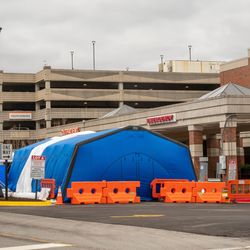Roseland Community Hospital has operated at about 90% of capacity every day since nearby MetroSouth Medical Center closed last year. The safety-net hospital, predominantly serving low-income families on the city’s far South Side, is now scrambling with the looming threat of a virus spreading rapidly throughout the country.
It’s a growing concern among health care providers who are attempting to balance the normal influx of hospital patients while dealing with rising coronavirus cases.
“I think even a single hospitalized COVID-19 patient causes an overburden for us because it brings staffing issues and concern of the virus transferring to other people,” said Dr. Terrill Applewhite, chairman of the hospital’s COVID-19 task force. “Even though we are facing this crisis we are still dealing with everyday ailments.”
Five of Roseland’s eight ventilators — three of which the hospital just received — were in use late last week. None was being used by COVID-19 patients.
The hospital has taken a number of measures, including re-purposing rooms, establishing an outside screening center and bulking up staff in preparation of the virus spreading exponentially in the coming weeks.
Roseland “hunkered down,” closing all entrances except for two to better monitor the flow of people entering and leaving the facility. It has cleared out its medical-surgical overflow unit and turned it into an isolation wing for COVID-19 patients; the closed unit is separated from the rest of the hospital.
All elective surgeries have also been canceled for the time being.
Applewhite said the hospital has received additional gowns, face shields, gloves and masks from the Illinois Department of Public Health. He was confident in his supply level but said that could easily change if the hospital is overwhelmed with hospitalized COVID-19 patients.
Still, the community hospital is having difficulties finding just one additional medical infrared thermometer.
Applewhite said by Wednesday the hospital’s drive-through COVID-19 testing site will be fully operational. They will be able to test people for the virus and deliver results within two-and-half hours. Current testing can take up to 10 days for results.
Danny Chun, a spokesman for the Illinois Health and Hospital Association, said there are supply issues throughout the health care system. So much so the advocacy group has pleaded with construction companies, dentist offices, universities and others to donate supplies of N95 respirator masks to their local hospitals.
“The health-care delivery system is being strained at every level,” Chun said. “Hospitals are already taking care of patients and using the limited supplies they had, but now they are left preparing for a pandemic.”
Chun said there needs to be more of an effort to protect hospital workers from the virus by getting them the correct protective gear, and there needs to be more emphasis on preparing rural hospitals that are already operating on thin margins.
“As the number of COVID-19 patients needing hospitalization increase, the supply pressure will only ramp up over the next few weeks,” Chun said.
Gov. J.B. Pritzker appeared on CNN Sunday morning to talk about the problems the state has faced in securing protective gear.
“We need millions of masks and hundreds of thousands of of gowns and gloves and the rest,” Pritzker said. “Unfortunately, we’re getting still just a fraction of that.”
:no_upscale()/cdn.vox-cdn.com/uploads/chorus_asset/file/19824591/CV_HOSPITALS_032120_01.jpg)
Dr. Brian Stein, the associate chief quality officer at Rush University Medical Center, couldn’t give the exact number of ventilators his network has but said they were fortunate to have more ventilators than most hospitals.
He’s not sure if the spread of the virus will overburden and cause shortages, “but at the same time, ventilators shortages are a concern for everyone.”
Rush’s network of hospitals have already established outside triage centers and ambulance bays with tents. Stein said they, too, have canceled all elective surgeries and only life-saving operations are taking place.
The hospital is now using empty surgical floors to treat patients and deploying surgical nurses to assist with the growing number of patients. They are working to increase the number of staff.
At Sinai Health System, an infectious disease control team is tracking developments. A physician at Mount Sinai Hospital tested positive for COVID-19 Friday morning.
“We are looking at all options for handling a surge of patients at Mount Sinai Hospital and Holy Cross Hospital, including using mobile triage trailers outside the building to handle patients with respiratory issues,” said Dan Regan, a spokesman for Sinai Health System. “We have also put plans in place to isolate patients in re-purposed rooms in our hospitals.”
Regan said the health care system is working with other hospitals to establish an agreement to transfer patients in the event they become overburdened. Yet he remained optimistic.
“We anticipate that most of of the people we will see with COVID-19 will not require hospitalization,” Regan said.
Still, the hospital is monitoring its supply chain and working to preserve its supply of masks and ventilators.
:no_upscale()/cdn.vox-cdn.com/uploads/chorus_asset/file/19824596/CV_HOSPITALS_032220_6.jpg)


































